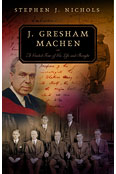
Stephen J. Nichols
Reviewed by: John R. Muether
J. Gresham Machen: A Guided Tour of His Life and Work, by Stephen J. Nichols. Published by P&R Publishing, 2004. Paperback, 252 pages, list price $13.99. Reviewed by OP historian John R. Muether.
Professor Nichols of Lancaster Bible College offers here the third of his series of "guided tours," following previous treatments of Martin Luther and Jonathan Edwards. The "Valiant for Truth" of the early twentieth century is accorded a brief biographical synopsis, followed by surveys of his major works, organized into three categories: Machen the scholar, Machen the citizen, and Machen the churchman.
There are some minor blemishes in Nichols's study. He overplays the extent to which Watts's "When I Survey the Wondrous Cross" functioned as Machen's favorite hymn. The full name of the mission board that Machen founded in 1933 was "the Independent Board for Presbyterian Foreign Missions." More seriously, to describe Machen's legacy as the creation of three institutions (Westminster Seminary, the IBPFM, and the Orthodox Presbyterian Church) is misleading, for surely Machen conceived of the Independent Board not as a permanent fixture, but as an emergency measure and a means, toward the end of establishing a faithful church that would conduct Presbyterian foreign missions.
The book's weaknesses are few, however, and its strengths are many. Nichols ably covers the theological landscape of Machen's age, including diverse voices such as Erdman, Speer, Macartney, and McGiffert. Of Machen antagonist Harry Emerson Fosdick, Nichols rightly observes that, even today, "we meet him everywhere we turn."
In his survey of Christianity and Liberalism (1923), he demonstrates Machen's masterful deconstruction of the modernist message in the Presbyterian Church. It was not liberal, nor was it modern, nor was it scientific (in the best senses of those terms). Most importantly, it was not Christian. Many of Machen's admirers, including this reviewer, are guilty of underestimating his book What Is Faith? (1925). Taking a cue from Machen biographer Ned B. Stonehouse, Nichols recommends that it be read as a sequel to Christianity and Liberalism, completing the polemic of the earlier book with a positive statement about the nature of Christian orthodoxy and saving faith.
In his final section, "Machen the Churchman," Nichols underscores that Machen's preaching was an essential part of his literary legacy. His study of several sermons, including "Constraining Love" and "The Good Fight of Faith," reminds us that Machen never strayed from his commitment to historic Presbyterianism. And, although he never taught homiletics, there is valuable instruction from Machen for young preachers. "The Bible is the only way to avoid monotony" in the pulpit, he told his students, and when the cross of Christ is faithfully preached, only then can the minister experience the joy of elevating listeners "out of the crash and jazz and noise and rattle and smoke of this weary age."
In the end, this is an unsatisfying book, and that is its chief virtue. For Nichols's tour ends with the reader yearning to dig deeper. His bibliographical suggestions direct us to the weightier biographies by N. B. Stonehouse and D. G. Hart. Even better, he encourages a reading of Machen himself, whose major works remain in print. If another generation of Orthodox Presbyterians picks up Machen's work (including his "friendly" Greek grammar!), we may have Nichols to thank.
August 31, 2025
J. N. Darby and the Roots of Dispensationalism
August 24, 2025
August 17, 2025
Reformed Covenant Theology: A Systematic Introduction
August 10, 2025
August 03, 2025
July 27, 2025
July 20, 2025
© 2025 The Orthodox Presbyterian Church